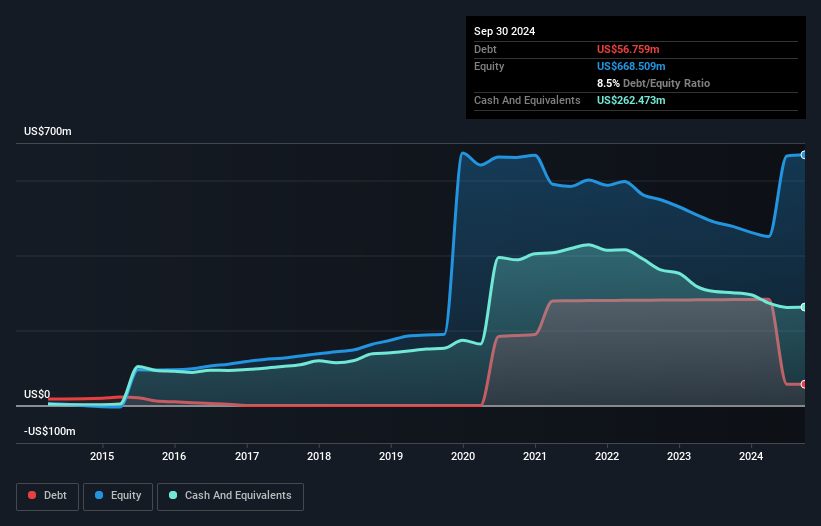David Iben put it well when he said, 'Volatility is not a risk we care about. What we care about is avoiding the permanent loss of capital.' So it seems the smart money knows that debt - which is usually involved in bankruptcies - is a very important factor, when you assess how risky a company is. Importantly, Glaukos Corporation (NYSE:GKOS) does carry debt. But the more important question is: how much risk is that debt creating?
Why Does Debt Bring Risk?
Debt is a tool to help businesses grow, but if a business is incapable of paying off its lenders, then it exists at their mercy. If things get really bad, the lenders can take control of the business. While that is not too common, we often do see indebted companies permanently diluting shareholders because lenders force them to raise capital at a distressed price. Having said that, the most common situation is where a company manages its debt reasonably well - and to its own advantage. When we examine debt levels, we first consider both cash and debt levels, together.
See our latest analysis for Glaukos
What Is Glaukos's Net Debt?
The image below, which you can click on for greater detail, shows that Glaukos had debt of US$56.8m at the end of September 2024, a reduction from US$282.4m over a year. However, its balance sheet shows it holds US$262.5m in cash, so it actually has US$205.7m net cash.

How Strong Is Glaukos' Balance Sheet?
According to the last reported balance sheet, Glaukos had liabilities of US$71.7m due within 12 months, and liabilities of US$186.4m due beyond 12 months. Offsetting this, it had US$262.5m in cash and US$56.4m in receivables that were due within 12 months. So it actually has US$60.8m more liquid assets than total liabilities.
This state of affairs indicates that Glaukos' balance sheet looks quite solid, as its total liabilities are just about equal to its liquid assets. So it's very unlikely that the US$8.25b company is short on cash, but still worth keeping an eye on the balance sheet. Simply put, the fact that Glaukos has more cash than debt is arguably a good indication that it can manage its debt safely. There's no doubt that we learn most about debt from the balance sheet. But ultimately the future profitability of the business will decide if Glaukos can strengthen its balance sheet over time. So if you want to see what the professionals think, you might find this free report on analyst profit forecasts to be interesting.
In the last year Glaukos wasn't profitable at an EBIT level, but managed to grow its revenue by 19%, to US$360m. That rate of growth is a bit slow for our taste, but it takes all types to make a world.
So How Risky Is Glaukos?
Statistically speaking companies that lose money are riskier than those that make money. And in the last year Glaukos had an earnings before interest and tax (EBIT) loss, truth be told. Indeed, in that time it burnt through US$81m of cash and made a loss of US$150m. While this does make the company a bit risky, it's important to remember it has net cash of US$205.7m. That means it could keep spending at its current rate for more than two years. Overall, its balance sheet doesn't seem overly risky, at the moment, but we're always cautious until we see the positive free cash flow. The balance sheet is clearly the area to focus on when you are analysing debt. But ultimately, every company can contain risks that exist outside of the balance sheet. Case in point: We've spotted 1 warning sign for Glaukos you should be aware of.
At the end of the day, it's often better to focus on companies that are free from net debt. You can access our special list of such companies (all with a track record of profit growth). It's free.
New: Manage All Your Stock Portfolios in One Place
We've created the ultimate portfolio companion for stock investors, and it's free.
• Connect an unlimited number of Portfolios and see your total in one currency
• Be alerted to new Warning Signs or Risks via email or mobile
• Track the Fair Value of your stocks
Have feedback on this article? Concerned about the content? Get in touch with us directly. Alternatively, email editorial-team (at) simplywallst.com.
This article by Simply Wall St is general in nature. We provide commentary based on historical data and analyst forecasts only using an unbiased methodology and our articles are not intended to be financial advice. It does not constitute a recommendation to buy or sell any stock, and does not take account of your objectives, or your financial situation. We aim to bring you long-term focused analysis driven by fundamental data. Note that our analysis may not factor in the latest price-sensitive company announcements or qualitative material. Simply Wall St has no position in any stocks mentioned.
About NYSE:GKOS
Glaukos
An ophthalmic pharmaceutical and medical technology company, develops therapies for the treatment of glaucoma, corneal disorders, and retinal diseases in the United States and internationally.
Excellent balance sheet with reasonable growth potential.
Similar Companies
Market Insights
Community Narratives




